Ford Kuga vs Peugeot 3008 - Differences and prices compared
Compare performance (243 HP vs 325 HP), boot space and price (34200 £ vs 35100 £ ) at a glance. Find out which car is the better choice for you – Ford Kuga or Peugeot 3008?
Costs and Efficiency:
Looking at overall running costs, both models reveal some interesting differences in everyday economy.
Ford Kuga has a barely noticeable advantage in terms of price – it starts at 34200 £ , while the Peugeot 3008 costs 35100 £ . That’s a price difference of around 900 £.
Fuel consumption also shows a difference: Peugeot 3008 manages with 2.40 L and is therefore to a small extent more efficient than the Ford Kuga with 2.80 L. The difference is about 0.40 L per 100 km.
As for electric range, the Peugeot 3008 performs convincingly better – achieving up to 698 km, about 630 km more than the Ford Kuga.
Engine and Performance:
Power, torque and acceleration say a lot about how a car feels on the road. This is where you see which model delivers more driving dynamics.
When it comes to engine power, the Peugeot 3008 has a noticeable edge – offering 325 HP compared to 243 HP. That’s roughly 82 HP more horsepower.
In acceleration from 0 to 100 km/h, the Peugeot 3008 is clearly perceptible quicker – completing the sprint in 6 s, while the Ford Kuga takes 7.30 s. That’s about 1.30 s faster.
In terms of top speed, the Peugeot 3008 performs minimal better – reaching 220 km/h, while the Ford Kuga tops out at 200 km/h. The difference is around 20 km/h.
There’s also a difference in torque: Peugeot 3008 pulls decisively stronger with 511 Nm compared to 240 Nm. That’s about 271 Nm difference.
Space and Everyday Use:
Whether family car or daily driver – which one offers more room, flexibility and comfort?
Both vehicles offer seating for 5 people.
In curb weight, Ford Kuga is barely noticeable lighter – 1526 kg compared to 1648 kg. The difference is around 122 kg.
In terms of boot space, the Peugeot 3008 offers evident more room – 520 L compared to 412 L. That’s a difference of about 108 L.
In maximum load capacity, the Ford Kuga performs hardly perceptible better – up to 1534 L, which is about 54 L more than the Peugeot 3008.
When it comes to payload, Ford Kuga somewhat takes the win – 550 kg compared to 467 kg. That’s a difference of about 83 kg.
Who wins the race?
The Peugeot 3008 proves to be wins the duel decisively and therefore becomes our DriveDuel Champion!
Peugeot 3008 is the better all-rounder in this comparison.
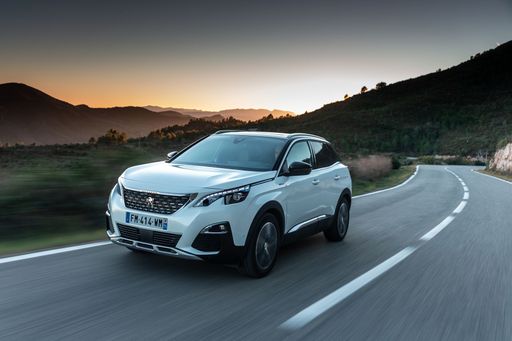
Peugeot 3008
Costs and Consumption
View detailed analysis
Engine and Performance
View detailed analysis
Dimensions and Body
View detailed analysis
Ford Kuga
The Kuga is Ford’s adaptable family SUV that blends usable space with a surprisingly lively driving character, making daily commutes and weekend escapes equally enjoyable. With smart interior packaging, an easy-to-use infotainment setup and composed road manners, it’s a sensible choice for buyers who want a bit of fun without the fuss.
details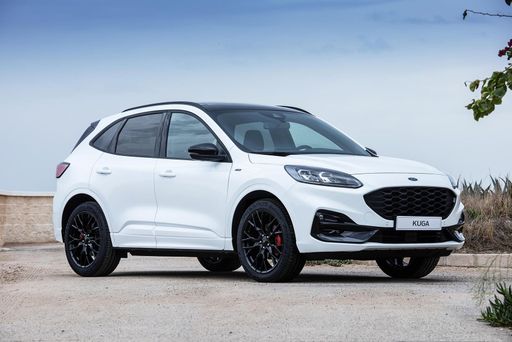
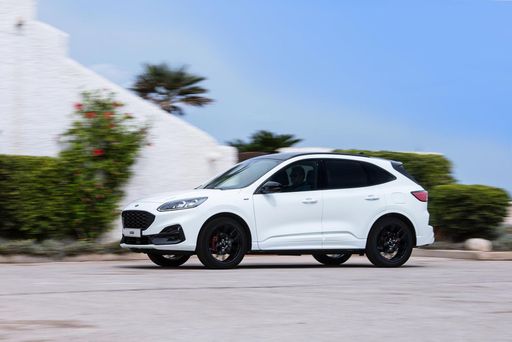

Peugeot 3008
The Peugeot 3008 blends bold French styling with a surprisingly grown-up interior that makes even dull commutes feel a little bit special. Practical enough for family life yet lively to drive, it’s a clever all‑rounder that stands out from the crossover crowd without shouting for attention.
details
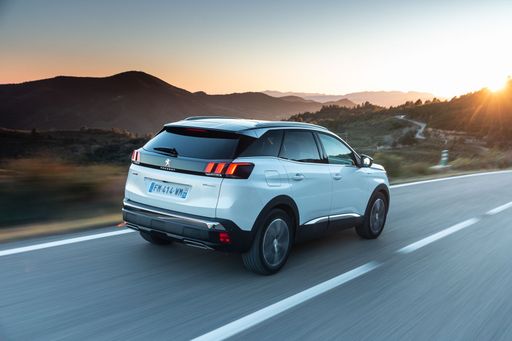

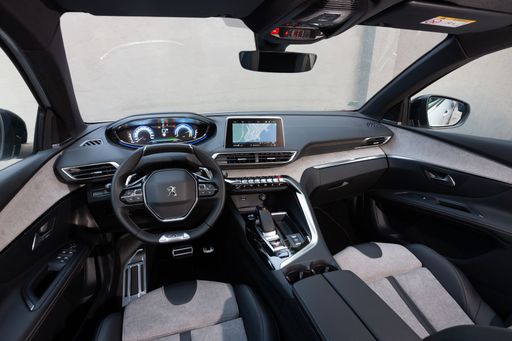
Costs and Consumption |
|
|---|---|
|
Price
34200 - 46300 £
|
Price
35100 - 52000 £
|
|
Consumption L/100km
2.8 - 6.8 L
|
Consumption L/100km
2.4 - 5.4 L
|
|
Consumption kWh/100km
-
|
Consumption kWh/100km
16.9 - 17.6 kWh
|
|
Electric Range
68 km
|
Electric Range
81 - 698 km
|
|
Battery Capacity
1.1 - 14.4 kWh
|
Battery Capacity
0.4 - 96.9 kWh
|
|
co2
55 - 154 g/km
|
co2
0 - 121 g/km
|
|
Fuel tank capacity
42 - 54 L
|
Fuel tank capacity
55 L
|
Dimensions and Body |
|
|---|---|
|
Body Type
SUV
|
Body Type
SUV
|
|
Seats
5
|
Seats
5
|
|
Doors
5
|
Doors
5
|
|
Curb weight
1526 - 1859 kg
|
Curb weight
1648 - 2266 kg
|
|
Trunk capacity
412 L
|
Trunk capacity
470 - 520 L
|
|
Length
4604 - 4645 mm
|
Length
4542 mm
|
|
Width
1882 mm
|
Width
1895 mm
|
|
Height
1673 - 1681 mm
|
Height
1641 mm
|
|
Max trunk capacity
1534 L
|
Max trunk capacity
1430 - 1480 L
|
|
Payload
541 - 550 kg
|
Payload
432 - 467 kg
|
Engine and Performance |
|
|---|---|
|
Engine Type
Petrol, Full Hybrid, Plugin Hybrid
|
Engine Type
Electric, Petrol MHEV, Plugin Hybrid
|
|
Transmission
Manuel, Automatic
|
Transmission
Automatic
|
|
Transmission Detail
Manual Gearbox, CVT, Automatic Gearbox
|
Transmission Detail
Reduction Gearbox, Dual-Clutch Automatic
|
|
Drive Type
Front-Wheel Drive, All-Wheel Drive
|
Drive Type
Front-Wheel Drive, All-Wheel Drive
|
|
Power HP
150 - 243 HP
|
Power HP
145 - 325 HP
|
|
Acceleration 0-100km/h
7.3 - 9.9 s
|
Acceleration 0-100km/h
6 - 10.2 s
|
|
Max Speed
195 - 200 km/h
|
Max Speed
170 - 220 km/h
|
|
Torque
240 Nm
|
Torque
230 - 511 Nm
|
|
Number of Cylinders
3 - 4
|
Number of Cylinders
3 - 4
|
|
Power kW
111 - 178 kW
|
Power kW
107 - 239 kW
|
|
Engine capacity
1496 - 2488 cm3
|
Engine capacity
1199 - 1598 cm3
|
General |
|
|---|---|
|
Model Year
2025
|
Model Year
2024 - 2025
|
|
CO2 Efficiency Class
E, D, B
|
CO2 Efficiency Class
A, D, B
|
|
Brand
Ford
|
Brand
Peugeot
|
What drivetrain options does the Ford Kuga have?
The Ford Kuga is available as Front-Wheel Drive or All-Wheel Drive.




